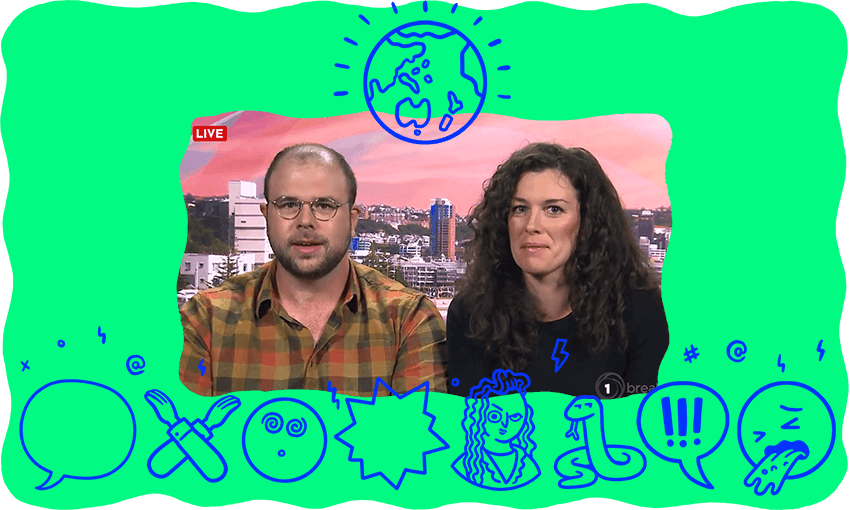Summer read: A five-minute TV interview about their overseas travel plans made Alie Benge and her partner the day’s main characters on New Zealand social media earlier this week. Here’s what the Facebook commenters got wrong.
First published April 21, 2022
My partner David and I found ourselves driving into the Wellington TVNZ studios on a dark Tuesday morning because, without really understanding how or why, our upcoming trip overseas had become a matter of national interest. Now we seem to have accidentally become the face of the “brain drain”; pawns for people in comment threads to criticise the government, to criticise young people, to criticise anyone who leaves this antipodean paradise. As our favourite comment said: “a writer and a mental health worker?… hardly a brain drain”.
We initially said no to doing the interview, not wanting to present ourselves as poor little economic refugees, or disgruntled citizens leaving in protest. We are, in fact, just doing something very boring and un-newsworthy: going on a long-overdue OE.
Brain drain: Kiwis heading overseas as living costs risehttps://t.co/7UsNmeBToM pic.twitter.com/ol7R8KWAoH
— 1News (@1NewsNZ) April 18, 2022
The statistic that started all this was MBIE’s estimation that 125,000 New Zealanders could leave Aotearoa this year now that the borders are open. Surely this statistic isn’t that surprising. Young New Zealanders have always left, many returning later with skills and experiences that might not have been attainable here. It’s not necessarily a protest against house prices or the cost of living. Travelling certainly won’t save us any money on petrol. Aside from housing, our relative price of living is similar to many major cities of the world. This is a basic reality that 100 different economists could give you 100 different explanations for. But we do acknowledge life isn’t cheap, and the rent is “too damn high”.
When the free-trade agreement between Aotearoa and the UK was first announced, a tenet of it was an extension of the youth mobility scheme. Currently, New Zealanders between 18 and 30 can live and work in the UK with a two-year visa. It was proposed that this be extended to those aged up to 35. However, when the agreement was finalised, there was no mention of the scheme, presumably due to a growing political anxiety about the risk of a brain drain. But this curtailing of young people’s opportunities could be exactly what keeps Aotearoa disconnected from the world at large. What doesn’t seem to be considered in these statistics is the upskilling that many “brain drainers” will do overseas, and what they’ll bring back.
Listen to Coming Home, The Spinoff’s 2020 podcast series about the influx of overseas New Zealanders who returned at the start of the Covid-19 pandemic, on Spotify, Apple, or wherever you get your podcasts.
Considering how much the world has changed, “brain drain” doesn’t necessarily mean the same thing it did pre-pandemic. One of the most significant changes we’ve seen in the last two years is a complete rethink of the way we work. Offices are losing their relevance. We’ve all learned how to use Zoom, and we seem to be past the initial hiccup of people’s faces stuck as cats or potatoes. Employers are learning to measure productivity based on output rather than hours sat at a desk. Momentum is even building for a four-day work week. Nothing but a pandemic could have gotten us to this point, but now we’re here, let’s think about it.
The irony of accidentally becoming the face of the brain drain is that we aren’t draining at all. We’ll be continuing to work as freelance editors, so the majority of our income and tax will still be in New Zealand, no matter where in the world we are. What if creative thinking around the way we work meant we could retain more of the skills and revenue young New Zealanders generate and minimise the impact of the brain drain?
If we are to accept the economic benefits of upskilled returning New Zealanders, we also need to consider and challenge the punitive attitude often shown toward people who leave. From a single day as the subject of a handful of news articles we’ve received comments like “Don’t let the door slam your fingers on the way out” and “Don’t come running back when you find the grass isn’t greener in Spain.” We expected this, of course, and we don’t take it personally. Comments like these are also nothing compared to those directed at New Zealanders who’ve been stuck overseas these last few years, trying to land a spot in MIQ.
There seems to be a perception in middle New Zealand that leaving Aotearoa is some deep insult, and if you’re going to insult us by visiting Spain then you’d better not come back. From a five-minute interview, David and I have found ourselves centred in exactly the kind of rhetoric that encourages these attitudes: that Aotearoa trains people up only for them to bugger off and give nothing back. Until, of course, a New Zealander makes us proud on the world stage, and we celebrate them and humbly claim them as our own. Would we still be the “little country that could” if no one ever left?
Aotearoa remains a small country miles from anywhere else – that’s one thing that hasn’t changed and never will. This isolation saved thousands of lives over the last two years, but now that we have an opportunity to reconnect with the global community once again, we can’t let what got us through hold us back.
Along with many other young New Zealanders leaving this year, we aren’t leaving to make a point, or to cast a vote of no confidence in Aotearoa. In reality, we’re leaving with the confidence of what this country has given us: safety in a pandemic, the opportunity for education, our identities, our values, and a home to come back to.

